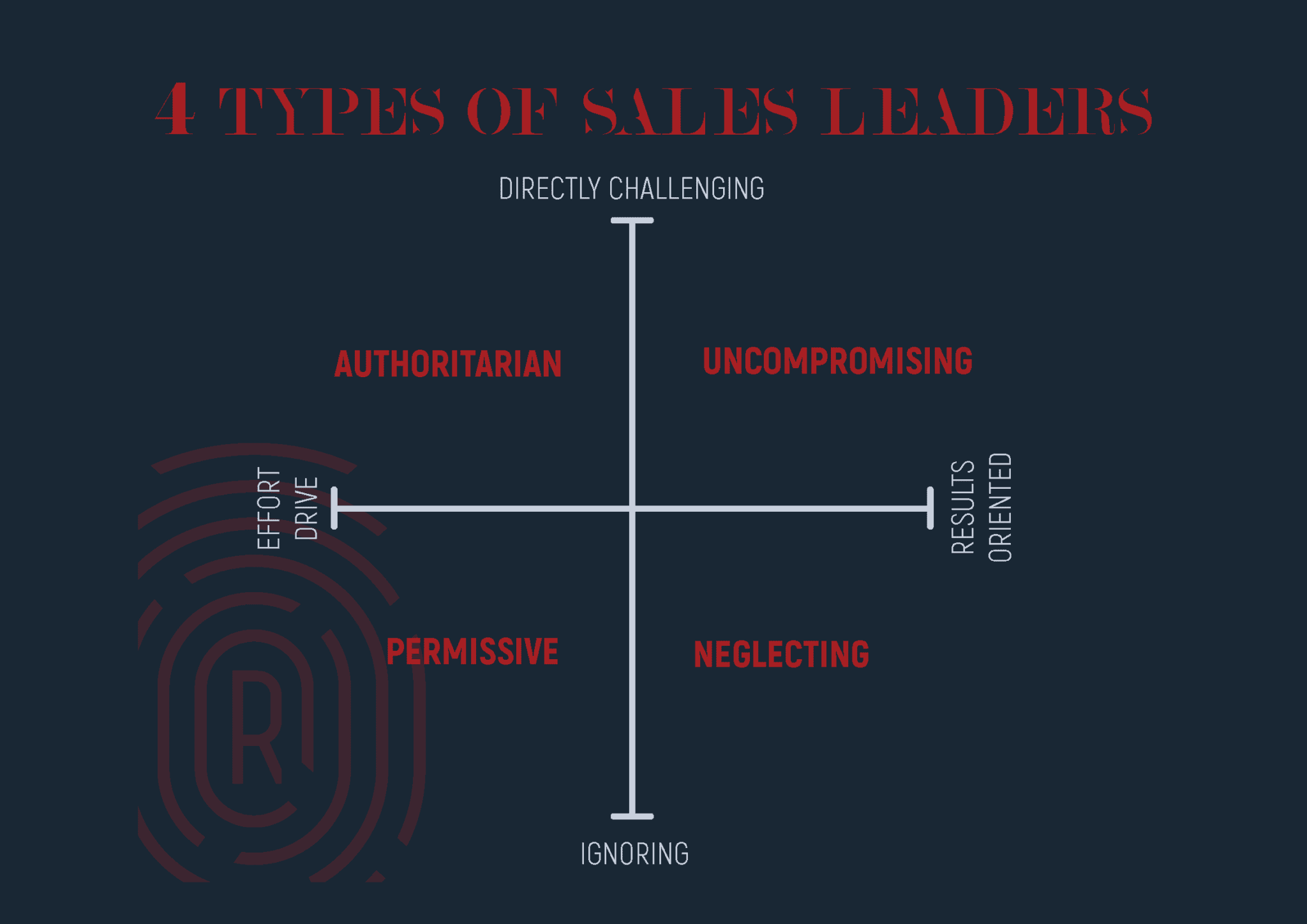- INSIGHTS
- Blog
Four Sales Leader Styles But Only One Yields Success
SURE, YOU MAY HAVE BEEN A GOOD SALESPERSON AT SOME POINT; BUT EFFECTIVE SALES LEADERS HAVE MORE THAN AN ABILITY TO CLOSE DEALS.
You feel you’ve done everything right, and somehow sales are still down. You’ve trained the sales team on the new process.
You’ve adopted a new CRM, tech stack and hired salespeople that are “rockstars and badasses.”
You’ve checked all the boxes, yet the only thing missing is the sales results.
You ask yourself: “What the h*ll is wrong here?!”
At this point, the answer lies with your sales leader, whether it is your VP of Sales, Vice President of Sales or sales manager.
“But the sales skills set is there.” I hear this all time. “What could be the problem?”
Many times, it boils down to leadership styles. The sales management styles play the difference-maker.
So, what are the different sales leader management styles?
Sales leaders typically default to one of four management styles:
1. Authoritarian
2. Permissive
3. Neglecting
4. Uncompromising
Recognizing the sales management style of your leader will help you better understand how to train them to increase productivity and succeed across the entire organization.
LEADERSHIP STYLES & SALES TEAMS EFFECTS

Typically, most sales organizations have under-developed sales leaders, unable to execute and deliver results month in and month out.
Sure, you may have been a good salesperson at some point; great sales leaders have more than an ability to close deals.
Your sales leader should touch every sales rep, every major client, every significant sales opportunity and impact them in a positive way towards success.
Unfortunately, most organizations overlook sales leadership when enhancing overall sales performance.
I cannot stress this enough – helping sales teams succeed requires more than having the right sales processes, tools, strategies, sales presentation, and sales training. It fundamentally comes down to the effectiveness of your sales leadership.
To lead high-performing sales teams, your success as a sales leader depends on utilizing your management skills, not just sales skills.
Your sales leader should touch every sales rep, every major client, every significant sales opportunity and impact them in a positive way towards success.
Effective leadership styles require a varied skillset:
- keeping the sales revenue goal on track;
- motivating the sales team to achieve the sales revenue goal;
- providing your team with overall direction;
- challenging and developing your team.
If they cannot influence your entire sales department, they aren’t functioning as a true leader.
I am essentially saying that your sales team’s support to achieve their full potential stems from your Head of Sales assuming the role of a cheerleader, disciplinarian, psychologist, and administrator – all in one.
Sure, it can be daunting, but you don’t have to start from scratch.
Rose Garden’s Sales Leader Evaluation Template
AUTHORITARIAN SALES LEADERS
The first sales management style is authoritarian.
Authoritarian sales managers are controlling and demanding and believe in unwavering obedience to strict rules that produce results.
Autocratic leadership is a top-down management style.

Common characteristics include:
- Leaders want the final decision on everything.
- Leaders create highly structured and often rigid environments.
- Discourages creative thinking.
- Encourages complete obedience.
- Discourages employee input, advice, or creativity.
A fundamental aspect of the Authoritarian leadership style is complete resistance to any change.
For these sales leaders, questioning the process or deviating from it becomes a problem because they don’t give the salespeople latitude or creativity to do their job, nor do they take advice from team members.
Consequently, these leaders vehemently deny any faults of their process, systems, or scripts, instead of blaming bad leads, the current market, solution price, or competitors for sales stagnation.
Effect on your sales team
You will have low sales team engagement and camaraderie, if not nonexistent.
I guarantee a high turnover of sales team members, including top talent.
Look at your sales department, and you will notice turnover results from your sales reps quitting rather than from termination.
On top of high turnover, your company’s sales hiring process rarely brings in fresh talent as the VP of Sales cannot find the “perfect” team member.
In reality, they have no clue what they’re looking for in an employee, and thus the quest is flawed.
Their determining factor for growth for a sales rep will be adherence to their specific sales process, and that’s it. Period.
The authoritarian sales leadership style requires sales reps to cope with a top-down approach.
The sales reps cope by suppressing their emotions and following their duties to get through the day.
To avoid making the sales leader upset, they will become obedient or eventually leave.
If they don’t obey, the sales leader will blame the rep instead of their management style.
The reps will do what they have to do instead of what they need, want, or should do.
If a sales team member does not obey, the authoritarian sales leader will blame the rep instead of their management style.
The authoritarian sales leadership style doesn’t allow for intrinsic interests or skill sets.
So, although the sales leader might look at the rep and assume they are happy because they’re following the process, the sales rep is very unhappy on the inside.
The team is worried about keeping out of trouble instead of accomplishing a meaningful goal.
The authoritarian style prevents the reps from growing or getting better at their job.
As a result, your salespeople will always have one foot out the door, which keeps the rep from truly buying in or going the extra mile to get their job done.
PERMISSIVE SALES LEADERS
The second management style is the permissive leader.
These leaders are overly optimistic, loving by nature, and don’t exert control over the team, essentially bringing a no-rules approach.
Common characteristics include:
- Leaders love by nature but may not be loved.
- Gives the entire team freedom with a no-rules approach
- Believe sales reps accounts without question
- Celebrates more minor sales results instead of focusing on larger goals
- Rationalize poor performance in sales reps actions
- Manages the sales teams like family or friends instead of a coach

They give their sales team complete freedom, never say no, or reprimand poor behavior.
Permissive leaders will believe most things the sales reps tell them because they inherently look for the good in people.
They will always see the glass as half full, if not overflowing.
This leader gets overly excited about small wins, typically multiple steps away from the primary goal or objective.
For example, a prospect responds that they will “consider the offer.”
This will make the permissive leader believe that they’ve closed the sale when they are woefully far from the revenue goal.
Permissive sales managers are quick to make excuses justify, and rationalize poor performance for sales rep’s actions.
Any reprimand for poor performance will always be the last resort for the leader; this makes it much more challenging to turn around a struggling sales rep because there are no consequences.
Instead of a coach, these leaders want to be friends with the reps. They have difficulty holding their team accountable and avoid having difficult conversations at all costs.
When they inevitably reprimand team members, it doesn’t yield the desired results, nor is it professionally executed.
Effects on your Sales Team
This sales management style creates an imbalance of power because the sales reps get whatever they want and have complete control over the sales leader.
The sales reps will do whatever they feel like, even if it’s overtly against the organization’s policies.
These sales reps eventually won’t control their emotions or deal with conflict well because they don’t have faith in the leadership.
The sales reps will often make mistakes, miss sales quotas, show up late, or downright disregard the code of conduct.
For example, a prospect responds that they will “consider the offer.” This will make the permissive leader believe that they’ve closed the sale when they are woefully far from the revenue goal.
Long-term, this leadership type does not allow sales reps to experience accountability and truly push themselves to achieve their full potential.
Unambitious reps will find comfort in their role and become proficient at being mediocre, thus never excelling.
Highly engaged and talented reps will become frustrated by the mediocre standards set and quickly leave to environments that challenge them and cultivate a growth mentality.
NEGLECTING SALES LEADER

On a different end of the quadrant is the neglecting leader.
Common characteristics include:
- Leader appears busy despite the inability to create results
- Absent or hide behind meetings
- Uninvolved or absent from sales team development
- Blame sales issues on bad leads, the current market, solution price, or competitors
- Absent from the sales hiring process
These sales leaders are uninvolved and uninterested in helping or coaching their team. They are consistently absent or hide behind meetings, claiming they are productive.
They keep themselves unavailable and busy at all times, yet projects are not moved forward.
Goals are not being hit, and reps are not being developed.
The neglecting sales leader style effectively offers zero function in your company. Identify this leadership style and get rid of them.
Effects on your Sales Team
Salespeople under a neglecting sales leader feel utterly alone in their jobs.
They have complete freedom but never receive any feedback or attention. They feel it doesn’t matter because the sales leader couldn’t care less.
The lack of attention leads to a lack of trust in sales reps’ abilities and their fellow sales reps. They become insecure and develop a negative image of their abilities.
The sales rep won’t grow and will seek guidance from outside the organization.
At this point, it’s a countdown to when your highest performers leave the organization.
All that will be left are problematic sales reps that are completely disengaged and don’t value the organization and toxic sales reps who will thrive in the environment because the negativity gives them a sense of control.
Remember, the sole purpose of a sales leader is to coach and consistently develop their team to meet more extensive and ambitious goals set by the business and its stakeholders.
Download Our Sales Leader Hiring Rubric
UNCOMPROMISING SALES LEADER
The final management style is the uncompromising sales leader.
Common characteristics include:
- Leaders are firm but loving and allow reps independence within limits
- Goal and target-focused, which is transparent to the team.
- Leaders desire to work solely with high-performers
- Active role with sales team development and hiring
- Leaders requires an unwavering commitment to the organization and goals
- Growth-minded
Importantly, these leaders understand that sales reps need independence inside specific parameters.
Uncompromising sales leaders do not accept missing goals and standards but are complementary and encouraging when they recognize team members excelling in their position.
Their sole focus is appropriately hitting the goal while growing highly engaged sales reps through professional development and the game plan.
These sales leaders can delineate quickly between high and low performers. They desire to work with high performers only.
They will tend to want to remove unengaged, stagnant, and low-performing reps.
They move fast and expect everyone to operate at their level.
Uncompromising leaders demand commitment and don’t allow for disengagement to be an option.
While turnover can sometimes be high under this style, the team members they retain will reach full potential growth and become very productive team members.

Effects on your Sales Team
Under the uncompromising leader, sales reps know that some tasks and goals may be complex, but they have support.
This helps them develop strength, endure hardship, and adequately express themselves.
It is essentially how the leader will earn respect from the entire sales team.
They agree to the goal and buy-in once they have discussed and understood their expectations and role within the team.
Sales reps understand that the sales leader is only concerned about the end target and holds them accountable.
This is opposed to being cold or cruel just for its sake, so the sales team fully engages.
An uncomprimising sales leader’s sole focus is appropriately hitting the goal while growing highly engaged sales reps through professional development and the game plan.
High performers will bring themselves up to the standards of the sales leader, whereas uncommitted and disengaged reps will find it challenging to work with this leader compared to the other sales management styles.
The uncompromising sales leader inconveniences underperforming reps with high standards and will be given a choice: fully commit or leave the organization.
So, while turnover may sometimes be high, this company turnover efficiently and effectively weeds out low-performing and disengaged sales reps.
BEST SALES LEADERSHIP STYLE
Influence is essential to all facets of their role as good leaders.
This includes:
- keeping the sales revenue goal on track;
- motivating the sales team to achieve the sales revenue goal;
- providing your team with the overall direction;
- challenging and developing the team.

If they do not can influence your sales team, they aren’t functioning as a true leader.
The most substantial influence they can employ for the sales team is the uncompromising management style.
While there is no perfect style, and ultimately every organization needs to discover its own, the uncompromising style has been and will continue to be the most effective at bringing out growth and the best in the sales team.
Uncompromising leaders foster a winning environment that doesn’t lead to more significant organizational problems down the line.
Get the Right Head of Sales Department
Maybe you’re looking at your company, and you feel you’ve done all the proper steps, and you’re still not seeing growth.
You have no idea the management style of your sales leader or how to develop high-performing reps, and you don’t know where to start.
Now enter Rose Garden Consulting.
We will guide you through every facet of your organization to better help you understand what needs to be valid for lasting success.
If you’re ready to tackle your longstanding sales challenges get in touch with us today. You can’t afford to leave anything up to chance.
Rose Garden Team Assessment

About the author:
Ali Mirza is the Founder & CEO of Rose Garden, a national sales consulting organization, and featured in Forbes, Inc, Business Insider, The Huffington Post, Business Rockstars, and The Wall Street Journal.
Ali is a highly sought-after public speaker presenting at multiple national conferences on innovative ways to accomplish transformational growth on your sales team.
Rose Garden provides unparalleled support and guidance to growth-minded founders via sales strategy differentiation, world-class sales culture creation, and exclusive playbooks, processes, and scripts to position them for limitless growth.
Related Posts:





